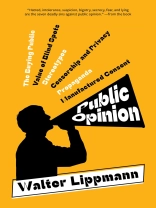Uncanny, prescient, and far-sighted, Public Opinion is an enduring cornerstone in political discourse and media studies. This Warbler Classics edition includes a detailed biographical timeline.
สารบัญ
Contents
Dedication
Part I. Introduction
Chapter 1. The World Outside and the Pictures in Our Heads
Part II. Approaches to the World Outside
Chapter 2. Censorship and Privacy
Chapter 3. Contact and Opportunity
Chapter 4. Time and Attention
Chapter 5. Speed, Words, and Clearness
Part III. Stereotypes
Chapter 6. Stereotypes
Chapter 7. Stereotypes as Defense
Chapter 8. Blind Spots and Their Value
Chapter 9. Codes and Their Enemies
Chapter 10. The Detection of Stereotypes
Part IV. Interests
Chapter 11. The Enlisting of Interests
Chapter 12. Self-Interest Reconsidered
Part 5. The Making of a Common Will
Chapter 13. The Transfer of Interest
Chapter 14. Yes or No
Chapter 15. Leaders and the Rank and File
Part 5. The Image of Democracy
Chapter 16. The Self-Centered Man
Chapter 17. The Self-Contained Community
Chapter 18. The Role of Force, Patronage, and Privilege
Chapter 19. The Old Image in a New Form: Guild Socialism
Chapter 20. A New Image
Part 7. Newspapers
Chapter 21. The Buying Public
Chapter 22. The Constant Reader
Chapter 23. The Nature of News
Chapter 24. Truth, News, and a Conclusion
Part 8. Organized Intelligence
Chapter 25. The Entering Wedge
Chapter 26. Intelligence Work
Chapter 27. The Appeal to the Public
Chapter 28. The Appeal to Reason
Biographical Timeline
เกี่ยวกับผู้แต่ง
Walter Lippmann (1889-1974) was a widely read American writer, reporter, and political pundit, whose six-decade tenure reshaped intellectual discourse. Renowned for his seminal contributions, he was instrumental in delineating the contours of the Cold War, pioneering the terminology of ‘stereotype’ and ‘manufactured consent, ‘ and offering incisive critiques of media and democracy. For his influential columns he was awarded two Pulitzer Prizes.












